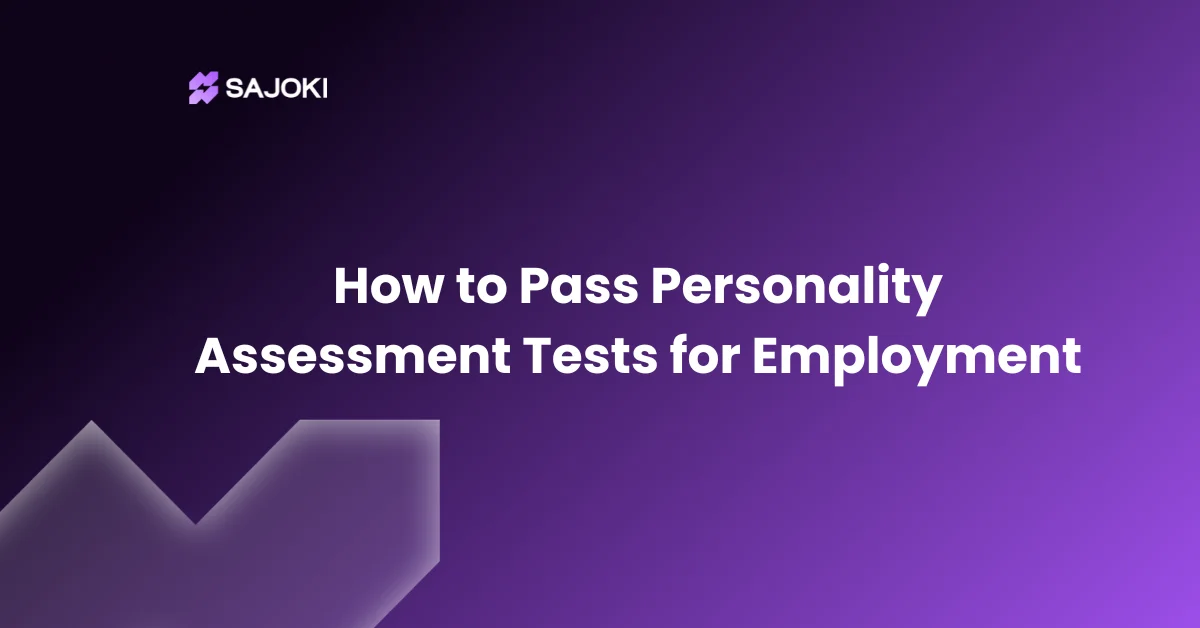Personality tests have become the standard in hiring practices in most industries. They give employers insight into whether a person is suited to fit into an organization’s culture and perform in work environments. So, preparation for it is as important as interview preparation.
So, how to pass personality assessment tests for employment? The key lies in being honest yet strategic. Highlight your strengths, stay consistent, and understand what each test measures. Prepare like you would for an interview. This way, you can present your best self without being insincere.
Personality tests can be prepared strategically without compromising honesty. It is a question of presenting your best strengths, being aware of your developmental areas, and being consistent. You can accurately represent yourself without being insincere with the proper approach and mindset.
Understanding Personality Assessment Tests
Personality tests evaluate traits such as emotional intelligence, motivation, dependability, teamwork, and leadership. Employers utilize them to make educated hiring decisions. They usually exist in multiple-choice or statement-agreement forms.
Tests such as the Big Five, DISC, and MBTI (Myers-Briggs) are popular. Each evaluates different facets of your personality and work style. These tests do not have “right” or “wrong” answers but look for patterns. Therefore, knowing what they evaluate is important.
How do you Pass Personality Assessment Tests for Employment?
After you start the test, it is important to stay calm and composed. Rushing or overthinking can negatively affect your answers. The following are test-taking tips:
1. Read Each Question Carefully
Don’t rush or guess through the statements. Every sentence is crafted carefully to evaluate a specific trait. Misreading can lead to an answer that misrepresents you.
Breathe deep before answering to ensure accuracy. Clarity in understanding questions leads to more honest and fitting responses. It helps maintain an even tone during the test.
2. Be Honest but Strategic
Don’t try to guess the “right” answer. Instead, be honest while aligning your answers with what the position requires. Highlight the personality traits that fit the job.
This approach allows you to be genuine but focused. It does not allow you to appear contradictory or too rehearsed. Remember, genuineness matters.
3. Be Consistent Across Repetitive Questions
Most examinations contain repetitive questions in different forms. Being consistent shows integrity. This also improves your reliability score.
Redundancy of questions is intentional to detect deception. Knowing this keeps you on your toes and in balance. Consistency across responses sends a message of trustworthiness.
4. Keep the Job Role in Mind
While being yourself, remember what the job demands. A managerial role needs you to be decisive whereas customer service needs empathy. Being tailored in response is beneficial but don’t overdo it.
Remember past situations where you would have displayed such behaviors. Recalling such moments during the test helps in keeping the responses aligned. Role awareness helps in making contextually relevant decisions.
5. Avoid Extremes
It may sound unrealistic to always choose “Strongly Agree” or “Strongly Disagree.” Middle answers show balance and open-mindedness. It also lessens the likelihood of sounding rigid or dogmatic.
Balance answers show you as open-minded and reasonable. Extremes may show impetuousness or obstinacy unless the question truly necessitates it. Attempt a thoughtful middle ground when unsure.
6. Pace Yourself Evenly
Avoid rushing or lingering on any one question. Pacing prevents burnout and ensures your mind stays fresh.
Employ a timer if the site facilitates it. Constant pacing ensures quality answers without anxiety at the finish. Consistency in timing ensures consistency in tone.
7. Trust Your First Instinct
Your first reaction is usually your real reaction. Overthinking might dilute your authenticity.
Second-guessing creates inconsistency. Trust your preparation and yourself. Trust your instincts strengthens genuineness.
7 Preparation Strategies Before Sitting the Personality Assessment Test for Employment
Although personality assessment tests for employment are not like traditional exams, preparing your mind can improve your performance. Preparation does not mean manipulation but intelligent self-presentation. Below are strategies to prepare well:
1. Research the Company and Role
Know the characteristics needed for the job. A customer service position, for instance, might require patience, empathy, and flexibility. Aligning your strengths with job requirements makes your responses more suitable.
Learning about company culture provides insight into what characteristics to highlight. Some organizations value teamwork; others might look for assertiveness. Your responses should show alignment with their expectations.
2. Get Familiar with Test Types
Take an online practice personality assessment tests for employment. You get a sense of what to expect. Familiar, you feel less nervous and more skilled in your response time.
Practice regularly sharpens your reflexes to respond consistently. There are some free websites offering simulations that are exactly like real job tests. Utilize them to build speed and confidence.
3. Know Your Strengths and Weaknesses
Self-awareness is heavily involved in these tests. Reflect on feedback and past performance. Be honest, but highlight characteristics that are employment-related.
If you’re well aware of your habits, less likely are you to contradict yourself. By knowing yourself, you can provide more confident and authentic answers. This practice will also benefit you when interviewing.
4. Be Consistent
Inconsistent responses can indicate dishonesty or lack of awareness. Answer on the basis of a consistent concept of self. Inconsistent responding is typically indicated by test scoring programs.
Being consistent does not imply being automatic. It merely means you have a clear, firm sense of your behavior. Practice can help reveal and resolve inner contradictions.
5. Get Proper Rest Before the Test
Mental clarity helps you to remain focused. Lack of sleep can lead to immediate responses which don’t represent your actual self. A well-rested mind promotes accuracy and focus.
Fatigue can distort the process of reading and responding to the questions. Minute errors reduce credibility. One of the simplest ways of maximizing performance is proper sleep.
6. Practice Self-Reflection Exercises
Daily journaling or guided self-reflection helps you know your behavior. These exercises build emotional awareness and self-regulation.
By knowing how you’ve handled past challenges, you can project qualities like resilience and patience. It creates a pattern of thoughtfulness that will naturally carry over into test answers.
7. Take Mock Personality Tests
Online mock tests that are available give an idea of how real ones are like. Websites like SAJOKI also offer practice tools to familiarize candidates with them in advance.
Mock tests help identify the spots of vagueness or contradiction. Practice would enable you to manage time and emotional responses with ease at the opportune time.
Existing Content Relevance:
What are Employers Looking for in Personality Assessments?
4 Mistakes to Avoid During Personality Tests
Making certain mistakes can unintentionally harm your chances. Here are some to steer clear of:
1. Faking Personality
Trying too hard to be someone you’re not can lead to inconsistencies. These are easily detected by the test’s algorithms. Instead, focus on being the best version of your true self.
2. Disregarding Instructions
Some candidates disregard specific instructions. This leads to confusion and mistakes. Always take a few seconds to read and understand what is being asked.
3. Overthinking Every Response
Overthinking may lead to delays and increase anxiety. Have faith in your gut after considering it for a moment. The more spontaneous your answers, the better.
4. Leaving Answers Blank
Most personality tests do not allow for unanswered questions about your personality. Not answering can invalidate your report. It’s okay to not know: pick what best describes your truth.
Frequently Asked Questions
Do personality tests determine if I get the job?
Not necessarily. They’re just a portion of the hiring process. Your interview, resume, and abilities are just as important.
Can I fail a personality test?
There’s no failing, but a weak fit can reduce your chances. The best you can do is fit, not be perfect.
To learn more, you can look at our in-depth article on how you fail a personality test.
How long do these tests take?
They’re generally 15 to 45 minutes, depending on what they are. Always check with the recruiter in advance.
Are employers trained to score these tests?
Yes. Many times, psychologists or trained HR administrators will score them. They compare patterns, not specific responses.
Should I answer differently for different jobs?
Tailoring is okay, but be consistent. Your defining characteristics should remain the same across applications.
Conclusion
Passing personality assessment tests for employment isn’t about tricking the system. It’s about showing your best, most relevant version of yourself. By preparing tactically and being aware, you can approach these tests boldly.
These tests give you and the employer valuable information. With honesty, awareness, and purpose, they can result in job opportunities where you’ll truly thrive.





















